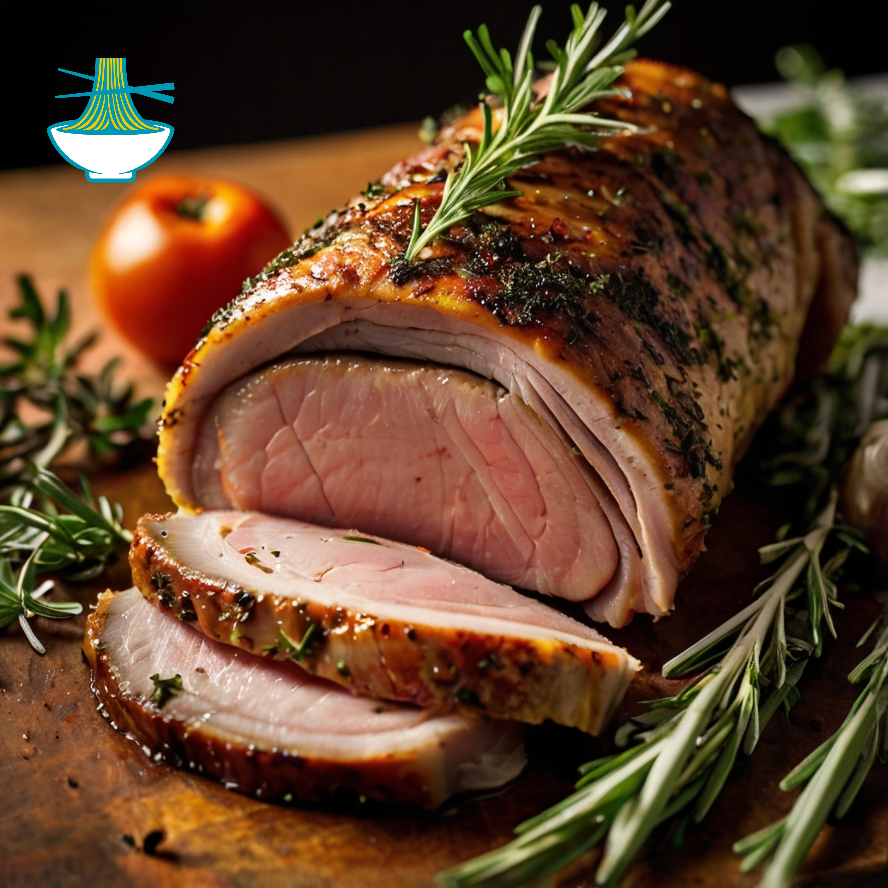Discover how to make the perfect Porchetta with our detailed recipe. This Italian classic features a whole pig seasoned with a blend of aromatic herbs, slow-roasted to achieve a crispy, golden skin and tender, flavorful meat. Ideal for special occasions or holiday feasts, this Porchetta recipe will impress your guests and elevate your culinary skills.
Ingredients:
- 1 whole pig (about 15-20 pounds), deboned
- 1/4 cup olive oil
- 4 cloves garlic, minced
- 2 tablespoons fresh rosemary, chopped
- 2 tablespoons fresh sage, chopped
- 1 tablespoon fresh thyme, chopped
- 1 tablespoon fennel seeds
- 1 tablespoon salt
- 2 teaspoons black pepper
- 1 tablespoon lemon zest
- 1/2 cup white wine
Instructions:
Prepare the Pig:
- If the pig is not already deboned, ask your butcher to do this for you. Lay the deboned pig flat on a clean surface.
Season the Pig:
- In a small bowl, combine olive oil, minced garlic, rosemary, sage, thyme, fennel seeds, salt, black pepper, and lemon zest.
- Rub the herb mixture all over the pig, making sure to get it into the folds and under the skin.
Roll and Tie:
- Carefully roll the pig up tightly and secure it with kitchen twine. Make sure the pig is tightly bound to ensure even cooking.
Roast the Pig:
- Preheat your oven to 325°F (160°C).
- Place the pig on a roasting rack in a large roasting pan. Pour the white wine into the pan.
- Roast for about 4-5 hours, or until the internal temperature reaches 165°F (74°C) and the skin is crispy and golden brown.
Rest and Serve:
- Remove the pig from the oven and let it rest for 20-30 minutes before slicing.
- Serve with your favorite sides and enjoy this succulent, herb-seasoned Porchetta!
Nutritional values
Here's the nutritional breakdown and benefits of the ingredients for roasting a whole pig:
Whole Pig (15-20 pounds, deboned):
- Calories: 242
- Fat: 18g
- Carbohydrates: 0g
- Protein: 20g
Benefits:
- High in protein, supporting muscle growth and repair.
- Provides essential amino acids and vitamins like B12, which is important for nerve function and red blood cell formation.
- Contains minerals such as iron and zinc, which are crucial for overall health.
Olive Oil (1/4 cup):
- Calories: 120
- Fat: 14g
- Carbohydrates: 0g
- Protein: 0g
Benefits:
- High in monounsaturated fats that support heart health.
- Contains antioxidants like vitamin E, which protect cells from damage.
- Adds flavor and helps with the cooking process.
Garlic (4 cloves, minced):
- Calories: 4
- Fat: 0g
- Carbohydrates: 1g
- Protein: 0.2g
Benefits:
- Contains allicin, which may have antimicrobial and immune-boosting properties.
- Supports heart health and helps regulate blood pressure.
- Adds a pungent flavor to the dish.
Fresh Rosemary (2 tablespoons, chopped):
- Calories: 2
- Fat: 0g
- Carbohydrates: 0.5g
- Protein: 0.1g
Benefits:
- Rich in antioxidants that help reduce inflammation.
- May support digestion and improve memory.
- Adds a fragrant, pine-like flavor to the dish.
Fresh Sage (2 tablespoons, chopped):
- Calories: 2
- Fat: 0g
- Carbohydrates: 0.5g
- Protein: 0.1g
Benefits:
- Contains antioxidants and anti-inflammatory compounds.
- May improve cognitive function and support digestion.
- Adds an earthy, slightly peppery flavor to the dish.
1 tablespoon fresh thyme
- Calories: 1
- Fat: 0g
- Carbohydrates: 0.2g
- Protein: 0g
Benefits:
- High in vitamins A and C, as well as antioxidants.
- May have antimicrobial properties and support respiratory health.
- Adds a warm, slightly minty flavor to the dish.
Fennel Seeds (1 tablespoon):
- Calories: 20
- Fat: 1g
- Carbohydrates: 3g
- Protein: 1g
Benefits:
- May aid in digestion and reduce bloating.
- Contains antioxidants and anti-inflammatory properties.
- Adds a sweet, licorice-like flavor to the dish.
Salt (1 tablespoon):
- Sodium: 2,300mg
Benefits:
- Enhances flavor of dishes.
- Essential for maintaining fluid balance and nerve function.
- Should be used in moderation to avoid excessive sodium intake.
Black Pepper (2 teaspoons):
- Calories: 6
- Fat: 0g
- Carbohydrates: 1.5g
- Protein: 0.2g
Benefits:
- Contains piperine, which may improve digestion and nutrient absorption.
- Adds a spicy kick and antioxidant properties.
- Enhances the overall flavor profile of the dish.
Lemon Zest (1 tablespoon):
- Calories: 1
- Fat: 0g
- Carbohydrates: 0.3g
- Protein: 0g
Benefits:
- Adds a bright, citrusy flavor to the dish.
- Provides some vitamin C and antioxidants.
- Enhances aroma and flavor without adding many calories.
White Wine (1/2 cup):
- Calories: 120
- Fat: 0g
- Carbohydrates: 4g
- Protein: 0g
Benefits:
- Adds acidity and depth of flavor.
- Contains antioxidants like resveratrol, which may support heart health.
- The alcohol mostly evaporates during cooking, leaving behind the flavor.
This recipe combines rich flavors and nutrients from the pig, herbs, and seasonings. The pork provides high-quality protein and essential nutrients, while the olive oil and herbs add healthy fats and beneficial compounds. The white wine and lemon zest contribute to the dish’s depth of flavor, enhancing the overall culinary experience.


Comments